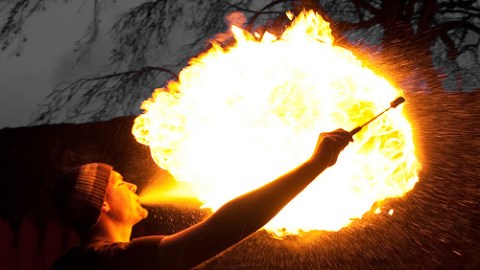The Twitter Report: Nice Guys Finish Last

Once again, I’ve gotten enmeshed in a debate on Twitter. This time it wasn’t with a theist, but with two atheists, Daniel Loxton and Reed Esau. It started with these two posts, which I happened to overhear:
I’d support a focussed movement to counter bigoted “atheists as hostile outsiders” stereotype. That mvnt wld be useful for me as an atheist
—@Daniel_Loxton, 2:27 PM – 18 Apr 12
@Daniel_Loxton Taking atheism out of the nutty, angry fringe and into the no-big-deal territory can do wonders in eroding that bigotry, IMO.
This was the point where I jumped in:
@reedes @Daniel_Loxton Problem is, we still get angry backlash even when we post signs that just say “You can be good without God.”
—@DaylightAtheism, 9:47 PM – 18 Apr 12
@reedes @Daniel_Loxton The religious majority doesn’t want us to be nice; they want us to not exist.
—@DaylightAtheism, 9:48 PM – 18 Apr 12
For reference, I was referring to stories like this, this, this, and even this. Even when atheists make entirely peaceful, positive, seemingly uncontroversial statements in public forums, we still get vicious rhetorical attacks and threats. I think incidents like these prove that we can’t possibly be “nice enough” to win everyone over, at least not if that’s our sole tactic.
@DaylightAtheism @reedes The religious folks I know are *at least* as accepting of atheism as the atheists I know are accepting of religion.
—@Daniel_Loxton, 9:55 PM – 18 Apr 12
@Daniel_Loxton @reedes Religious folks you know aren’t representative, then. Atheists are still targets of prejudice: bit.ly/rxo2Ey
—@DaylightAtheism, 10:03 PM – 18 Apr 12
@DaylightAtheism @Daniel_Loxton Will we fix that prejudice by perpetuating stereotype that atheists are part of a nutty/angry fringe?
—@reedes, 10:09 PM – 18 Apr 12
When you start worrying about “perpetuating” the angry-atheist stereotype, I find, it rapidly slips into the belief that any criticism of religion whatsoever, even if factually accurate, is off-limits if it makes religious people mad at us. This rewards irrationality by saying that whoever’s quickest to take umbrage can control the discourse and shut down legitimate criticism by crying about hurt feelings. A better course of action is to argue that atheists have real and legitimate reasons to be angry.
@DaylightAtheism @reedes Anti-atheist bigotry is comprised of the belief that we’re not nice. That’s the exact problem.
—@Daniel_Loxton, 10:13 PM – 18 Apr 12
@Daniel_Loxton @reedes Agreed, but I disagree that we can overcome it by proving that we’re nice. Bigotry isn’t based on evidence.
—@DaylightAtheism, 10:21 PM – 18 Apr 1
@DaylightAtheism @reedes Religious folks are not totally accepting of atheists, but atheists are also not totally accepting of religious ppl
—@Daniel_Loxton, 10:17 PM – 18 Apr 12
Again, even if this were true, so what? I’m not going to fall into the trap of the media spokespeople who insist on apportioning blame equally to both sides, even when that’s far from the truth. Religious people exercise the vast majority of the power and privilege in our society, and are therefore responsible for a similarly vast majority of the discrimination we experience. Religious groups, despite all their inflated cries of persecution, have suffered nothing remotely comparable at our hands.
@DaylightAtheism @reedes Bigotry isn’t born from evidence—but bigotry always gleefully seizes upon anything that looks like confirmation.
—@Daniel_Loxton, 11:29 PM – 18 Apr 12
@DaylightAtheism @reedes Refusal to take bigotry lying down requires keeping the moral high ground. Without that, outrage is just hypocrisy.
—@Daniel_Loxton, 11:31 PM – 18 Apr 12
I could have continued this debate much longer, but in the name of not being overly argumentative, I didn’t respond any further on Twitter after that. However, there’s more I wanted to say on the topic, so I’m going to say it here.
This is one case where the brevity of Twitter runs roughshod over nuance. I do believe that atheists should do more charity work, both because it’s the right thing to do and because it will improve our public image – but I think it’s worth doing more for the former reason than the latter. We can win some favorable press coverage, change some minds around the margins, but it won’t do the heavy lifting of getting people to accept us.
It’s not as if religious groups came to hate us because they noticed a lack of atheist volunteers at soup kitchens. The bigotry came first, and the reasons to justify it were invented later. As I said, bigotry isn’t based on evidence, and even if we devoted all our time to doing charity, with nothing left over for activism, they’d just find another reason to hate us. (“Those smug atheists, giving to charity all the time! They’re only doing it because they think they’re better than everyone else!”)
The real causes of anti-atheist bigotry are complex, but I think at least part of the reason is that we violate the unspoken social agreement that you need religion to be a good person or to have a life worth living. In that respect, atheists are more threatening, not less, when we’re nice. Friendly, happy atheists pose a bigger threat to a religious worldview which says that such a thing should be impossible. As student activist Matt LaClair said, “The nicer you are, the more they hate you,” and I think this is the reason why.
For this reason and others, being nice alone won’t end anti-atheist bigotry. To do that, you need to change the culture, and the way you change the culture is by fighting fiercely for your rights. Once people accept that they can’t silence you or get rid of you, they get used to the idea of negotiating and giving you what you want. Really, this should be obvious from any informed reading of history.
The civil rights movement didn’t end Jim Crow laws by stressing that blacks were really nice people whom whites would enjoy mingling with if they’d just give it a try. The women’s suffrage movement didn’t gain equality by arguing that women were dainty and harmless, so men could grant them the vote without fear of the result. All these movements and others had marches, protests, fiery speeches, mass civil disobedience, coordinated political activism. They fought ferociously for equality, and they won! This is a lesson we can and should draw from. As I said in one final retort on Twitter, “Progressive movements succeed through passion, activism and refusal to take bigotry lying down – not niceness.”
Image credit: poolski, released under CC BY-SA 2.0 license





